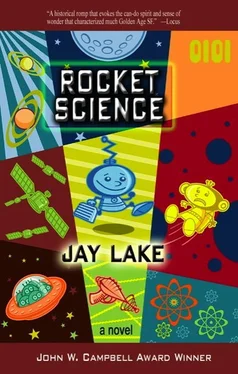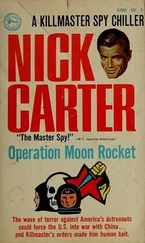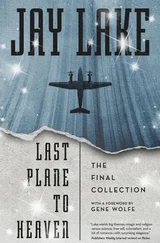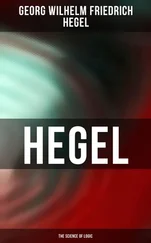There wasn’t anything else to say, so I simply said, “Thanks.” I remembered our takeoff from the Bellamys’ barn, so I added, “You might want to hit the dirt right about now.”
I stepped over to the pilot’s seat and laid my body down in it. I ached so much I wasn’t sure I would ever be able to get up again, but that didn’t matter. Behind me, I heard the hatch hiss shut. I glanced at Floyd, who was looking over his shoulder at Dad. Floyd turned to smile weakly at me.
“Old man’s still alive, huh?” he asked. It was almost like talking to the old Floyd, my Floyd.
“Yeah.” Grudging, I gave into his attempt at good will. I grabbed the flight control handles and looked at the main viewer. It showed the array of cops and soldiers out in the street. They seemed to be getting ready to fire a volley at Pegasus. “Time to go,” I said out loud. “Mind the air traffic overhead.”
“Takeoff in three seconds,” said Pegasus in my ear. I hoped Dad wouldn’t be buffeted too much, then remembered how smoothly we had lifted from the burning barn. The next thing I knew, Broadway Street was getting smaller and smaller in the main viewer. I was glad to see Mrs. Milliken getting to her feet as we pulled away. The cops swarmed over her as I glanced at the other view screens.
I followed the highway into Wichita. I wanted to tend to Dad, but there really wasn’t much I could do for him in his current state. Pegasus needed me to navigate. We flew about two hundred feet above the asphalt, heading toward the city.
As we passed over the outskirts of Augusta, I saw that there was a roadblock set up along the dike at the west edge of town, right where the Cadillac had seized up on me. They were serious about cutting off the town, I realized. We overflew the roadblock with an air speed of at least three hundred miles per hour.
“We will be over metropolitan Wichita in about three minutes,” said Pegasus, “but we are being pursued by two North American P-51 Mustangs. Model ‘D’ versions.”
“How the heck do you know that?” I asked.
“I can see them on multiple frequencies.”
“No, no.” I shook my head. Pegasus was very smart, smarter than I without a doubt, but it could miss the obvious. “How do you know they’re P-51Ds?”
“The Luftwaffe provided me with an extensive set of Axis and Allied aircraft recognition data. I can resolve mechanical details at a power of ten thousand to one, so it is not difficult for me to match aircraft types already known to me.”
“Fine, fine.” This was another capability I could understand well enough to make me profoundly jealous. Would that I could inspect the fasteners I bought for Boeing with that level of detail. We’d never have another parts failure again. But where had the Army gotten Mustangs in eastern Kansas anyway? As far as I knew there wasn’t a fighter wing at military section of Wichita Municipal. “Are they going to catch us?”
“Not in open flight,” said Pegasus, “but when we land to discharge your father they will have a distinct operational advantage.”
And we were going to blow past the Beech, Cessna and Boeing plants and Wichita Municipal before reaching the St. Francis Hospital. The fighter pilots behind us would get awfully nervous when Pegasus started buzzing industrial sites essential to the war effort, or whatever we called that now. “What can you do about them?”
“Nothing,” said Pegasus. “The aircraft are too primitive for their pilots to survive the craft being disabled. I will not destroy them.”
“What will fifty caliber bullets do to you?”
“They will cause very little damage to me in flight,” said Pegasus, “as I generate my own shielding with a combination of electromagnetic manipulation and the atmospheric pressure waves on my airfoils. But when we set down to discharge your father, we will be vulnerable.”
I doubted that the Mustangs would follow us down to street level in Wichita. The pilots would have orders not to endanger the civilian population. Plus no pilot in his right mind would perform a low-altitude, high-speed pass over a big city, not even a hot dog fighter jock with murder in his eye. Too many radio masts, water towers, power lines and so forth. So our biggest danger would probably be in lifting out again.
“All right,” I said. “We’re just going to have to go in and hope for the best.” I looked at the screen. The Beech plant was approaching on the right. We were in Wichita. The highway was now Kellogg Street, and I could see traffic. I could also see wrecks happening on the road as drivers became distracted by the passage of Pegasus overhead.
Great , I thought. Just what we needed. More death and destruction. I hoped the people in the street below would be safe.
We flew past Wichita’s airport, in the process violating every flight rule I knew of regarding traffic patterns and approach procedure. The hospital was coming up, just past the corner of Murdock and 9th. I glanced up at the array of smaller screens. Pegasus showed a tail view of two Mustangs chasing us. They were clearing Wichita city limits as I banked steeply to make it down to Murdock Street and the hospital.
“Pegasus, we need to be at the entrance of that large white building three blocks ahead,” I said, releasing the control handles. “Mind the power lines.”
“I am aware of them,” said Pegasus.
I could swear it was acquiring a dry wit.
We slowed to a crawl, moving just above the street. I had no idea how Pegasus was able to remain airborne with such a low groundspeed. That certainly wasn’t a function of the computational rocket’s airfoils. People ran into buildings and dove to the sidewalks as we cruised along. I felt a bump through Pegasus’ deck as we grazed the top of a bus.
The tail view of the Mustangs rocked and spun as we tracked them flying overhead. After a moment, I could see them in the main viewer. They were turning to make a pass back at us. I prayed they wouldn’t shoot. The fifty caliber guns on those fighters would chew up the street below us like a rat through cheese.
Pegasus pitched down suddenly and landed with a gentle bump. “I suggest you conduct your business quickly, Vernon Dunham.”
The hatch opened behind me as I unclipped my seat straps. I jumped up and tried to grab Dad by the feet, to drag him towards the exit. My entire body protested. My hip was feeling worse, and I suspected I was dislocating my shoulder.
“Vernon,” Floyd said again. “Please. Let me help.”
Damn it all , I thought. “Cut him loose,” I told Pegasus.
Floyd rolled up out of his chair and got his hands under Dad’s shoulders. I climbed painfully out of the hatch and down to the street. We were right in front of the St. Francis Hospital, a three-story brick building with a long history. Following the aerial pursuit, a crowd gathered, keeping its distance from Pegasus. I realized how I must look in my torn bathrobe, bandaged and bruised as I was. Heck, my undershorts were showing.
I didn’t care. I had to get Dad to a doctor I could trust.
“What’s going on, Mac?” somebody yelled from the crowd.
That was a question I should have anticipated. I’d been so concerned with getting here I hadn’t planned any further. I thought fast. “Top secret military experiment. I’ve got an injured man here.” I tugged on Dad’s legs, trying to get him out of Pegasus as Floyd worked him from the other side, keeping his head from banging on the deck.
A couple of men from the crowd edged out across the open space toward me, obviously wary. One of them said, “Looks like a dead body to me.”
“He will be a dead body if I don’t get him into the hospital,” I said, grunting with the strain of Dad’s weight.
Читать дальше












